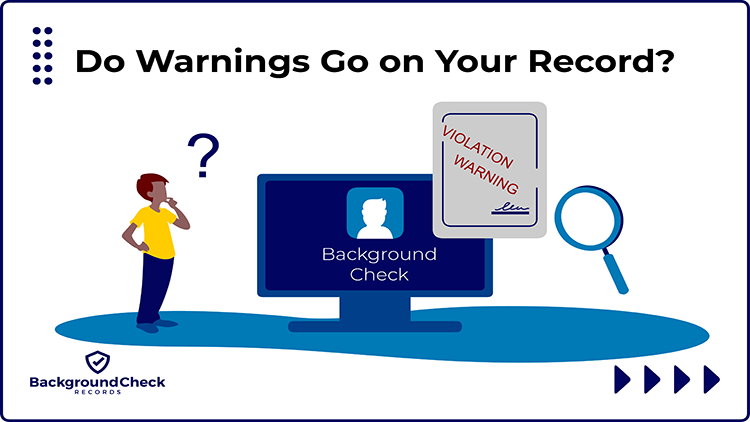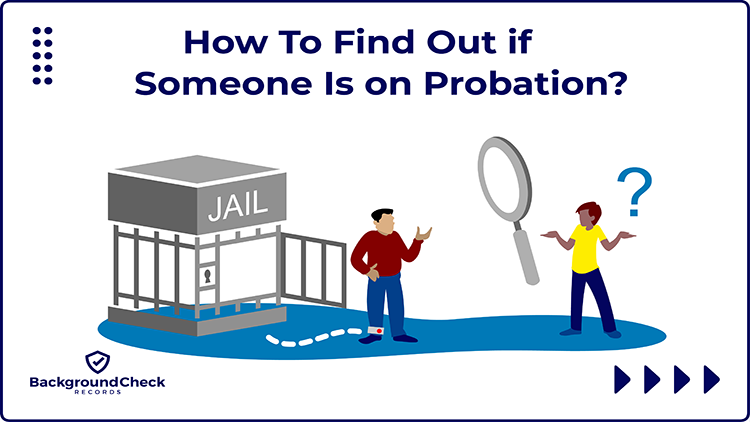We use cookies to ensure that we give you the best experience on our website. If you continue to use this site we will assume that you are happy with it.
How Long Does a Misdemeanor Stay on Your Record? (Forever)
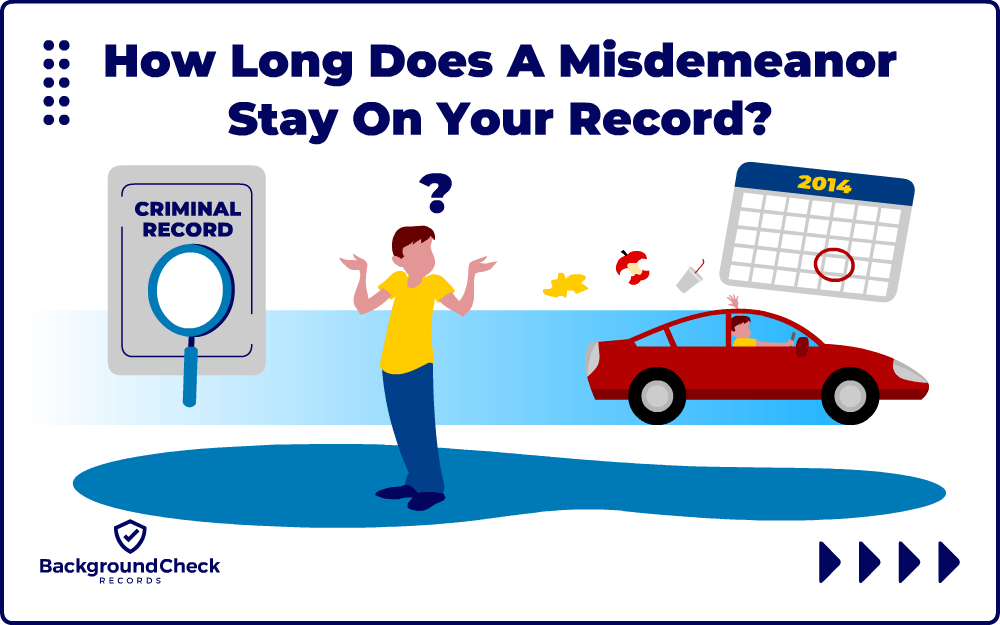
Table of Contents
In 2020, over 5 million misdemeanors went to trial in the United States.1,2 The duration that a misdemeanor remains on your record, however, may be a concern.
The unfortunate truth is that misdemeanor convictions don’t go away and they can remain on a criminal record forever. However, the there a few things a person can do to help get rid of or hide misdemeanor charges but it depends on the charge and the state where it was filed.
How Long Do Misdemeanors Stay On Your Record, & Why?
Because they are considered court records, misdemeanors don’t just go away and they stay on a person’s record forever unless there is a specific state law requiring the record be expunged or sealed after a set amount of time. Or if someone manually seals or expunges the misdemeanor themselves or with legal aid.
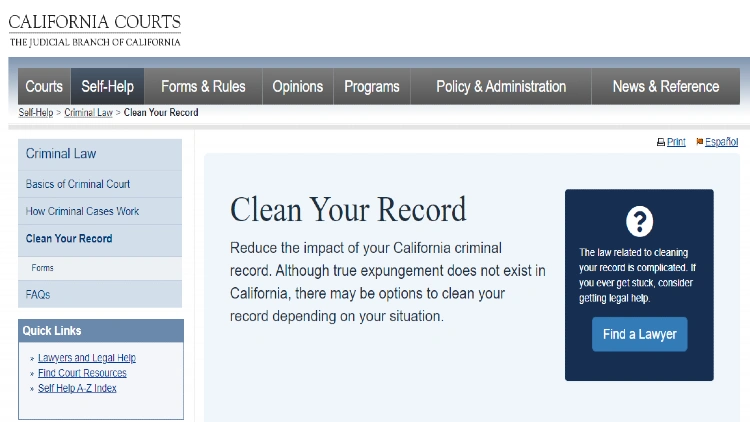
So, a misdemeanor can potentially be permanent on your record
Unless the subject of the record petitions the court to expunge the record it will remain part of the person’s criminal history indefinitely. And petitioning the court means the subject (referred to as the defendant) files a request with the court to seal or erase the record. This is usually handled with the aid of an attorney, but some states have the option for defendants to e-file a petition for expungement.
Another reason misdemeanors stay on a record forever is that the defendant doesn’t file the petition to expunge or has not met the necessary criteria to expunge a record. Also, because each state has its own expungement laws, and each state has its own crime classification system, knowing when and how to expunge a record can be complicated.
The classification of the misdemeanor can also impact whether or not it is eligible for expungement. Lower-level misdemeanors are usually traffic violations or non-violent (sometimes called victimless) crimes. Higher classification misdemeanors can sometimes include assaults or property damage.
Does the Type of Misdemeanor (Class 1, 2, or 3) Matter When Removing Them From Your Record?
Misdemeanor classification is a major factor regarding removing or expunging it from the record, but laws vary from state to state. An understanding of the types of misdemeanors can help determine if the charge has the potential to be expunged.
Class One Misdemeanor
Class 1 misdemeanors are typically your most serious misdemeanor offenses. Certain states designate these as Class A misdemeanors, and North Carolina has an additional misdemeanor level of Class A1 for the same type of offenses that would be considered a 1 or A Class offense in other states. Below is an example of how North Carolina sentences each misdemeanor classification.
| North Carolina Misdemeanor Guidelines | |||
| Misdemeanor Class | Level 1 (No Previous Convictions) | Level 2 (at least one but no more than 4 convictions) | Level 3 (Five+ prior convictions) |
| A1 | 1 to 60 days (Community/Intermediate/Active Punishment) | 1 to 75 days (Community/Intermediate/Active Punishment) | 1 to 150 days (Community/Intermediate/Active Punishment) |
| 1 | 1 to 45 days (Community) | 1 to 45 days (Community/Intermediate/Active Punishment) | (Community/Intermediate/Active Punishment) |
| 2 | 1 to 30 days (Community) | 1 to 45 days (Community) | (Community/Intermediate/Active Punishment) |
| 3 | 1 to 10 days (Community) | 1 to 15 days (Community for 1 to 3 prior convictions)
1 to 15 days (Community/Intermediate for 4 plus prior convictions) |
(Community/Intermediate/Active Punishment)3 |
These offenses usually include crimes such as assault and battery, misdemeanor DUI, and certain property crimes where loss or damage meets a specific threshold. Many domestic violence-related misdemeanors fall under Class 1 as well.
A misdemeanor possession charge that falls under Class 1 is usually for what is called Schedule 1 controlled substances. Schedule 1s are things such as crack, heroin, or other narcotic drugs.
Because these are higher-level misdemeanors, sometimes involving domestic violence or other assaults, they are more difficult to expunge or seal.
Class Two Misdemeanor
Class 2, or sometimes designated Class B, misdemeanors are considered lesser offenses in that the amount of damage or harm is not as great as Class 1 or A. Crimes of this nature can include trespassing, disorderly conduct, or reckless driving. Simple assaults can also fall under this category.
Repeat shoplifting misdemeanors are usually class two violations. In some states, these charges may appear under the phrase “concealing merchandise” or “petty theft” rather than shoplifting.
Class two misdemeanors are a bit easier to expunge or seal, especially if they are first-time convictions.
Class Three Misdemeanor
Class 3 misdemeanors are typically the least serious criminal offenses a person can be charged with; however, even Class 3 misdemeanors can result in incarceration if certain conditions are met.
Class 3 misdemeanors usually include first-time shoplifting offenses or simple possession of marijuana (typically small amounts for personal use). In some states, these are referred to as class C misdemeanors.
A class 3 misdemeanor have much impact on a person’s record. Even minor misdemeanors can have a huge impact on a person’s future. Traffic misdemeanors can fall under this category, and failure to pay fines can result in greater charges or loss of driving privileges.
Traffic violations are often not eligible for expungement or sealing because they are lower-level misdemeanors that often do not jeopardize a person’s freedom.
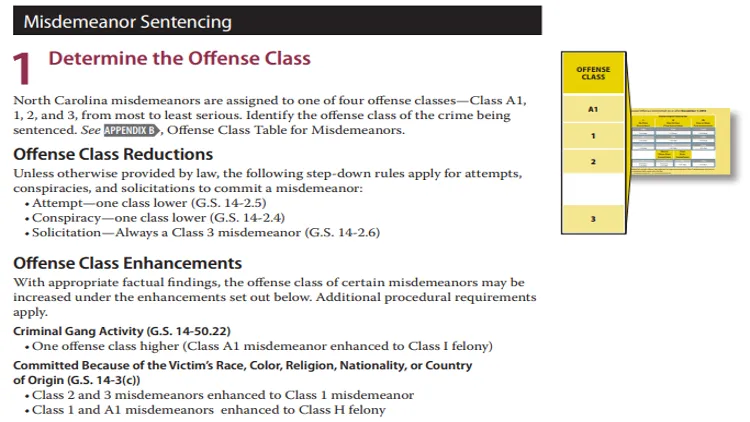
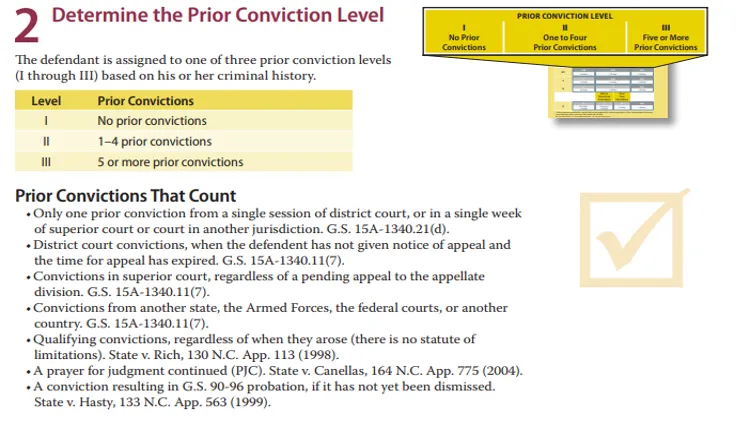
Infractions
Infractions are usually minor traffic violations; however, whether an offense is designated as an infraction or misdemeanor depends on state laws.
Understanding the misdemeanor classifications can help determine which cases are eligible for expungement, which classifications can have the greatest impact if they appear on a background check, and can help clarify the length of stay of a misdemeanor on a record.
Traffic Misdemeanors
DUI misdemeanors and driving misdemeanors can result in loss of driving privileges, higher insurance premiums, and large fines and fees. Failure to comply with court sanctions can result in supervised probation or incarceration as well.
The next step in determining how long misdemeanors appear on criminal records is learning what the laws are in each state.
State Laws & Waiting Periods Surrounding Expunging or Sealing Misdemeanors
Each state has its own laws regarding expunging misdemeanor convictions or those misdemeanor charges that resulted in non-convictions. Non-convictions include not guilty verdicts, dismissed charges, and dropped charges.
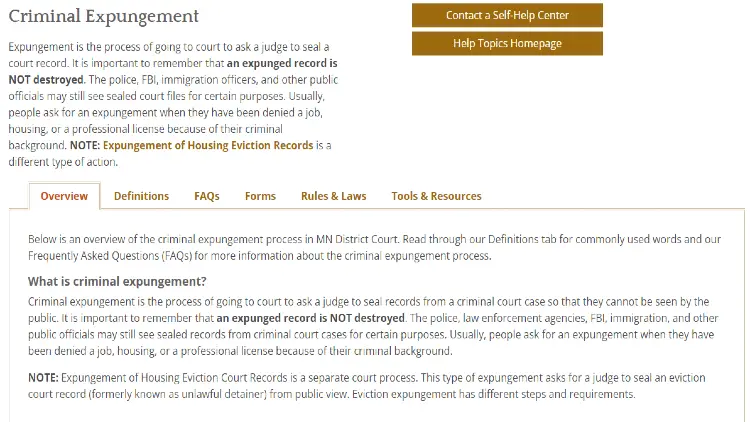
Duration of a Misdemeanor on a Record in Each State
The table below outlines the state law regarding expunging or sealing misdemeanor charges.
| State | Stipulations | Wait Time to Expunge Misdemeanor Charges |
| Alabama | Completion of court-ordered deferment program No other convictions during the time between conviction and petition to expunge A conviction cannot be for a violent offense, sex offense, or one of moral turpitude. |
3 years from the time of conviction |
| Alaska | Charge dismissed or conviction overturned based on the determination of the mistaken identity of false accusation | No set time frame |
| Arizona | Arizona has no expungement law. Convictions can be set aside, but the charge will still show up on a criminal records check. | No, wait once conditions of sentencing have been completely fulfilled. |
| Arkansas | Conviction is not for a crime of moral turpitude, domestic violence or sexual assault. | 5 years following completion of sentencing requirements |
| California | Automatic expungement for dismissals. Convictions where conditions of sentencing have been met. At the court’s discretion |
Once all sentencing conditions have been met or the misdemeanor has been dismissed. |
| Colorado | Juvenile records except for sex offenses. Underage drinking Underage driving offenses Adult misdemeanors can be sealed when: Minor drug possession conviction Municipal violations Petty misdemeanors Cases of mistaken identity. |
90 days to 10 years depending on the nature of the offense. Most misdemeanors are sealed automatically 7 years after completion of sentencing requirements. |
| Connecticut | The case was dismissed. Non-violent misdemeanors All sentencing requirements were met. |
13 months from the date of dismissal or 3 years from completion of sentencing requirements. |
| Delaware | Dismissed in the subject’s favor Deferred prosecution conditions met No pending charges No currently incarcerated or on probation or parole Have not received an expungement in the past 10 years You have no unpaid fines or fees |
3 years from fulfillment of all sentencing requirements. |
| Florida | No pending charges Completed all sentencing requirements A misdemeanor is a non-violent offense |
There is no set time frame; however, if a person has petitioned for expungement within the 10 years prior to the current petition to expunge, the request will be denied. In other words, only one expungement every 10 years is allowed for misdemeanors. |
| Georgia | Seals cases not referred for prosecution and closed by law enforcement Pay processing fee |
2 years |
| Hawaii | $35 fee for first-time petition $50 fee for non-first-time petitions Misdemeanors except those of moral turpitude or violent crimes |
1 year |
| Idaho | Charges dismissed Acquittals |
Within 1 year of charges |
| Illinois | Automatically removes charges that were vacated (dismissed) from the public record. No pending charges Completion of sentencing requirements Eligible misdemeanor offense |
2 years |
| Indiana | No pending charges Juvenile offenses |
1 year from date of arrest or charge |
| Iowa | No pending charges Cannot have two previous deferred judgments All fees and fines are paid |
8 years |
| Kansas | Non-violent misdemeanors Pay docket fee of $176 |
1-year minimum |
| Kentucky | Automatically removes charges dismissed with prejudice from the public record. Sentencing conditions met Payment of $40 fee |
5 years |
| Louisiana | Conviction set aside Charge dismissed Completion of sentencing requirements |
5 years |
| Maine | Does not have an expungement law, but individuals can challenge incorrect info on record | N/A |
| Maryland | When arrested/detained but not charged Acquittals Dismissed charges Convictions for crimes later removed from the criminal code |
60 days to 8 years |
| Massachusetts | No more than 2 records Non-violent offenses No sex offenses No domestic violence |
3 years |
| Michigan | Automatically removes dismissed charges for certain crimes from the public record. Non-violent misdemeanors |
7 years |
| Minnesota | No pending charges No conviction for gross misdemeanor |
4 years |
| Mississippi | First-time offenders Traffic violations not eligible |
1 year from the date of arrest |
| Missouri | Non-violent misdemeanors No domestic violence |
1 year |
| Montana | Completed all terms of sentencing No pending charges |
5 years |
| Nebraska | When charges are dismissed Misdemeanors’ convictions can be “set aside” but are not erased or expunged. |
3 years after the sentence requirements have been fulfilled. |
| Nevada | Misdemeanor offenses that are not violent crimes | 5 years |
| New Hampshire | Completed terms of sentence Pay $125 court costs + additional fees as required |
10 years for domestic violence misdemeanors, 3 years for all others |
| New Jersey | Misdemeanor was dismissed Misdemeanor convictions with an exception for violent crimes |
5 years following fulfillment of sentencing conditions |
| New Mexico | All misdemeanor non-convictions and convictions are eligible | 1-4 years following fulfillment of sentencing requirements |
| New York | Automatically removes charges dismissed in the accused favor from public record. Less than 2 misdemeanors in a 10-year period Not on probation or parole Successful completion of drug treatment program |
10 years from the date of conviction or date released from prison, probation or parole. |
| North Carolina | After Dec 1, 2021, charges dismissed without leave or dismissed by a judge are automatically removed from the public record. Pay a $175 filing fee |
5 years |
| North Dakota | Removal of cases from public records only applies to dismissals following deferred prosecutions. The conviction was the result of being a human trafficking victim Possession of one ounce or less of marijuana Unconstitutional arrest Juvenile record |
3 years |
| Ohio | Juvenile Records Survivors of Human Trafficking Dismissed charges Minor misdemeanors |
1 year |
| Oklahoma | Removal of cases refers only to first-time drug offenses dismissed following a deferred prosecution. Pay a $150 processing fee Acquittals Reversal of convictions Pardoned individuals Exoneration pursuant to DNA testing No pending charges |
1 year |
| Oregon | Most misdemeanors are eligible | 3 years following conviction |
| Pennsylvania | Removal of all non-convictions, including dismissals, from public record, immediately following the dismissal or acquittal. | 1 year |
| Rhode Island | Non-violent misdemeanors | 5 years |
| South Carolina | Removal of cases dismissed in summary court unless the party was fingerprinted when an arrest is made. Successful completion of sentencing requirements Pay $250 processing fee |
As soon as the dismissal or completion documentation is filed by the clerk of court’s office. |
| South Dakota | Sealing of first-time misdemeanor or felony charges that are dismissed. | 1 year |
| Tennessee | The judge must inquire if the defendant wants the record destroyed when the case is dismissed. No more than 2 misdemeanor convictions total (or 1 misdemeanor and 1 non-violent felony) All sentencing conditions met |
5 years |
| Texas | Refers only to Order of Non-Disclosure for deferred prosecutions. Completion of sentencing requirements |
180 days to 3 years |
| Utah | Removal of cases from the record when dismissed with prejudice. Crime free for the requisite amount of time |
5-7 years |
| Vermont | Older misdemeanors will automatically be removed from records. Completion of all sentencing requirements No further convictions |
10 years |
| Virginia | Automatic removal refers only to deferred and later dismissed marijuana possession cases. Person was pardoned Victims of identity theft Pay the filing fee of $86 and service fee of $12 |
7 years |
| Washington | Misdemeanor convictions No pending charges Juvenile records |
3-5 years |
| West Virginia | Completion of sentencing or probation or parole | 1-2 years |
| Wisconsin | Juvenile offenders Victims of trafficking |
N/A |
| Wyoming | Non-violent misdemeanors | 5 year |
Knowledge of state laws regarding expunging or sealing misdemeanor cases helps determine the duration of a misdemeanor on a record.
Again, each state has its own expungement laws and its own laws about what can show up on a background check and how the information can be used.
Do Misdemeanor Charges Show Up On Background Checks?
Misdemeanor convictions are public records showing a court has found a person responsible or guilty of committing a crime and as such, misdemeanors can show up on background checks.
However, there are laws that can help protect individuals from unfair hiring and housing practices based on criminal history. These laws, called “Ban the Box” or “Fair Chance” statutes or policies, help those with criminal history get a second chance when seeking a job or renting property.
Federal Ban the Box Law
The United States law that helps protect applicants with misdemeanor convictions when applying for jobs is called the “Fair Chance to Compete for Jobs Act.” This law prohibits federal agencies from inquiring about criminal history until a conditional offer of employment has been made.
The law further limits how the information can be used when making an employment determination. If the conviction has no bearing on the job applied for, a person cannot be denied employment based on the record alone. The Office of Personnel Management provides guidance to federal agencies regarding the use of criminal history when making job offers.4
Fair Credit Reporting Act (FCRA)
The federal Fair Credit Reporting Act (FCRA) prohibits background screening agencies from reporting any criminal history older than seven years when conducting a commercial background check.5 The US 9th Circuit Court of Appeals further ruled that the seven-year clock starts ticking when charges are filed, not when they have been resolved in court.6
State Ban the Box Laws
Each state has its own version of “Ban the Box” laws regulating whether or not certain misdemeanors can be used in employment or housing decisions. Links to state laws that have “Ban the Box” legislation are in the table below.
When seeking to know the amount of time a misdemeanor stay on your record, it’s also important to learn how those records can be used in accordance with state laws.
When a misdemeanor does show up on a criminal record, to have a clean slate, a person needs to know how to remove the offense from the public record. There are laws in each state that dictate what charges can be sealed or expunged, and the timeframe for requesting relief.
How to Remove Misdemeanors From Your Criminal Record
Removing a misdemeanor from a criminal record requires sealing or expunging the record. Sealing the record doesn’t erase it completely, but it does severely limit who can access the files.
Expunging the record removes or erases it from the court files as if the offense never occurred. When a record is expunged, the court’s order also directs law enforcement to destroy their case file containing investigative reports.
Some states have online portals to petition for an expungement or sealing of the misdemeanor file. Other states require the subject of the record to retain an attorney to request expungement.
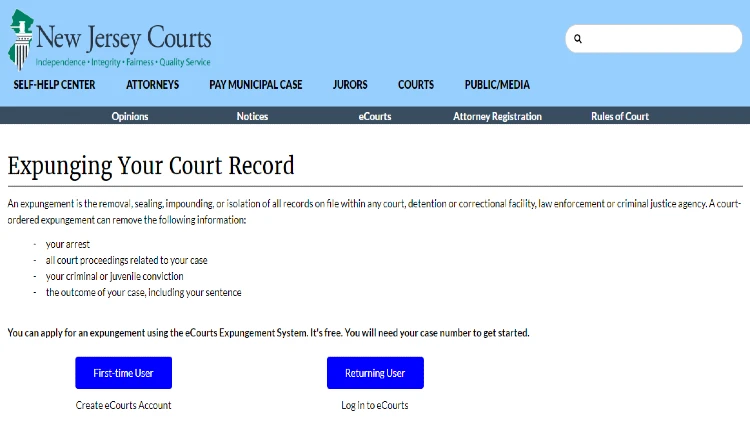
It is always a good idea to hire an attorney to make sure the motion to expunge (the formal request to the court) is completed properly, there are no restrictions in place that can prevent expungement, and that the proper notices are sent to law enforcement to destroy records when expungement is granted.
Once the court hears the petition and makes a decision, the files are not destroyed that same day. The clerk of court must prepare the proper notices and send them to the appropriate agencies along with the notice to destroy records.
In some states, the files are sealed but not expunged. Other states expunge the records but do not destroy them. In both situations, the files are not public records; however, they can still be accessed by law enforcement or when a court order states they can be reviewed or released.
How Long Does it Take For a Misdemeanor to Come Off Your Record After Removing?
Once a judge orders a record to be expunged or sealed, the amount of time from the court ruling to the actual destruction or sealing of the record can vary depending on the state.
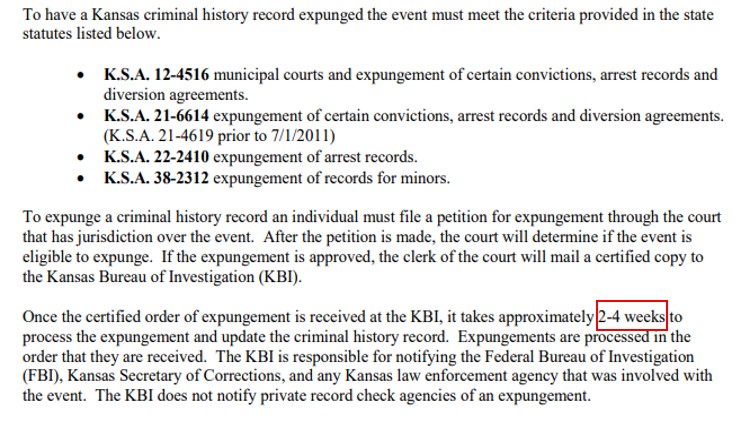
The table below shows how much time an agency or court has to destroy or seal records when charges are expunged or sealed.
| Amount of Time a State Has to Destroy or Seal Expunged or Sealed Records | |||
| State | Time Limit | State | Time Limit |
| Alabama | 2-4 months | Montana | 30 days |
| Alaska | Upon entry of an order to seal by a judge | Nebraska | Within days of the judge’s order to set aside the conviction |
| Arizona | Once a judge orders a conviction set aside it is noted in the official record. | Nevada | 6-8 months |
| Arkansas | 90 days | New Hampshire | 20 days |
| California | 90-120 days | New Jersey | 90-120 days |
| Colorado | Immediately when file becomes eligible | New Mexico | 10 days |
| Connecticut | Upon entry of judge’s order to pardon or expunge | New York | 5-6 months |
| Delaware | Up to 150 days | North Carolina | Several months from filing petition to disposition |
| Florida | 9 months | North Dakota | ND law separates conviction record from criminal record; therefore, even if a case is expunged it can still show up on a criminal record check as a non-conviction |
| Georgia | 2-3 weeks | Ohio | 6 weeks |
| Hawaii | 120 days | Oklahoma | 30-45 days |
| Idaho | Immediately following entry of an order by a judge | Oregon | Following court order and payment of $33 processing fee |
| Illinois | 60 days | Pennsylvania | 30 days to several months |
| Indiana | 4-6 months | Rhode Island | Upon entry of an order by a judge to expunge |
| Iowa | Record is sealed but not erased upon entry of an order by a judge | South Carolina | 2-6 weeks (may take up to 6 months in larger jurisdictions) |
| Kansas | 2-4 weeks | South Dakota | Upon entry of an order by a judge |
| Kentucky | 60 days | Tennessee | Upon entry of an order by a judge |
| Louisiana | 60 days | Texas | 60-90 days |
| Maine | Upon order by a judge to correct record | Utah | 180 days |
| Maryland | 90 days | Vermont | 60 days |
| Massachusetts | Upon entry of an order by a judge | Virginia | 90-180 days |
| Michigan | 2 months | Washington | Upon request by the subject of record when non-conviction or order by a judge to vacate the conviction |
| Minnesota | 4-6 months | West Virginia | 90 days |
| Mississippi | Upon entry of order by judge | Wisconsin | Upon subject submitting a request to destroy the record |
| Missouri | 6-12 months | Wyoming | 180 days |
With more and more agencies using background checks for housing, employment, or licensure, having a clean criminal record is important. Having even a misdemeanor on a record can impact a person’s future. Unfortunately, it is possible for a misdemeanor to stay on your record forever.
References
1 National Center for State Courts. (n.d.). YouTube. Retrieved July 28, 2022, from <https://www.courtstatistics.org/court-statistics/interactive-caseload-data-displays/csp-stat-nav-cards-first-row/csp-stat-criminal>
2 Uniform Crime Reporting (UCR) Program — FBI. (n.d.). FBI.gov. Retrieved July 28, 2022, from <https://www.fbi.gov/services/cjis/ucr>
3 Theoharis, M. (2019, September 20). North Carolina Misdemeanor Crimes by Class and Sentences. Www.Criminaldefenselawyer.Com. <https://www.criminaldefenselawyer.com/resources/north-carolina-misdemeanor-crimes-class-and-sentences>
4 Second Chance Act Federal Job Search Guide. (n.d.). OPM. Retrieved July 28, 2022, from <https://www.opm.gov/policy-data-oversight/diversity-and-inclusion/reference-materials/second-chance-act-federal-job-search-guide.pdf>
5 Fair Credit Reporting Act. (n.d.). Federal Trade Commission. Retrieved July 28, 2022, from <https://www.ftc.gov/legal-library/browse/statutes/fair-credit-reporting-act>
6 Moran v. The Screening Pros, LLC. (n.d.). Consumer Financial Protection Bureau. Retrieved July 28, 2022, from <https://www.consumerfinance.gov/compliance/amicus/briefs/moran-screening-pros-llp/>

